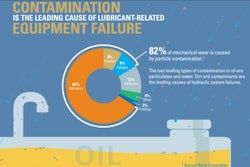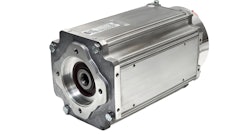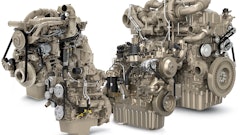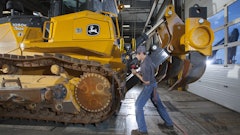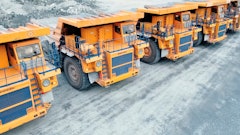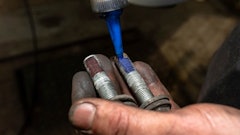
Propane has long been a trusted fuel source to provide jobsite power, and now propane is being used more and more as a “one fuel solution” as construction firms look for efficiencies that reduce costs and keep projects on schedule.
Propane’s reliability as a small engine fuel source has led to a growing number of construction applications being powered by the versatile fuel, and it’s a jobsite fuel that equipment rental businesses should be expecting to hear potential construction managers ask more about.
The good news is rental store owners might already be familiar with propane if they’re a cylinder-exchange site for homeowners who use propane. The familiarity with the fuel can provide a unique opportunity for rental store owners to target additional customers in the light-construction market as propane increases its presence on construction equipment throughout the jobsite.
While the cylinders themselves will be different than those rented to homeowners, the fuel still comes from the same place. The fact that a rental store already has a partnership in place with a local propane retailer can minimize the effort involved for rental businesses to extend its propane offerings and attract a new group of customers to the store.
It’s more important than ever for equipment rental stores to understand propane, what it powers and what’s most attractive about the fuel before construction managers walk through the door inquiring about it.
Propane powers inside and out
Propane’s emissions profile actually allows the fuel to be used both indoors and outside. When compared to gasoline, propane emits 15 percent fewer greenhouse gases and 40 percent less carbon monoxide. This small difference can mean huge gains from a crew productivity standpoint.
Propane-powered heaters can be safely used indoors with proper ventilation to provide a more comfortable workspace for employees while meeting the humidity or heat conditions for drying and curing material finishes. Additionally, moving materials around a site can be easier with propane-powered aerial lifts, forklifts, and wheel buggies that can carry items inside, without having to move product to hand carts, requiring additional equipment on a busy site, or delays caused by uncharged batteries.
Propane engines can also power concrete finishing equipment, including riding trowels, grinders, polishers, floor strippers, and concrete saws, reducing trip hazards from electrical cables. Outdoor propane light towers can also help make full use of a day and keep jobsites safe with better visibility during low-light conditions.
Propane is versatile
Busy construction months can mean a lot of back-and-forth travel between multiple sites for managers, crew members, and equipment. But even when contractors are moving employees and equipment from the home office to a single jobsite, using propane autogas work trucks can keep with the one fuel solution approach to help lower costs.
A variety of light- and medium-duty vehicles can be powered with propane autogas — vans for transporting crews and tools, pickups for hauling trailers, even larger medium-duty chassis up-fitted with dump bodies or cranes — to fit the vehicle needs of many construction firms. It’s possible, too, that a contractor’s existing vehicles can be converted from gasoline to propane autogas, a cost-effective way for companies to begin using the alternative fuel.
Refuel how it best suits their jobsite
The refueling process is really where propane can push a construction company’s jobsite productivity to the next level. Refueling with propane can be tailored to the specific needs of a company, as well as for each specific project or jobsite.
There are two main options for refueling equipment with propane: a cylinder exchange program and on-site refueling. Both options are designed to significantly reduce downtime spent at offsite refueling stations, which can help projects stay on time and under budget.
For example, with a cylinder exchange program, propane cylinders are stored in a cage either at a corporate office or on a jobsite. Contractors can work with a propane retailer to set a schedule to exchange empty cylinders with full ones for a hassle-free, grab-and-go system for employees - no waiting at a refueling station.
Construction companies can install a larger propane tank at a corporate office for on-site refueling, or work with a propane retailer to set up a portable propane tank on a long-term jobsite. Refueling infrastructure can be permanently or temporarily installed or temporary depending upon the need. This can be beneficial to businesses considering incorporating propane autogas vehicles, which can also be used with on-site or temporary refueling setups connected to an autogas fuel dispenser.
Propane stored in tanks and cylinders - no matter how long - won’t deteriorate if kept in storage. Locked cages can also prevent theft of smaller cylinders, and fuel cannot be siphoned off from fuel tanks for other use.
Propane can reduce fuel costs
One of the most attractive benefits construction business owners can see with propane is reduced fuel costs. Propane costs less per gallon than gasoline or diesel. Construction companies can further protect themselves from market fluctuations (and help them forecast their annual fuel costs in the process) by entering into a fuel contract with a local propane retailer if they don’t get their fuel supplied by the rental store.
As propane increases in demand throughout the light-construction market, the opportunity for rental stores to take advantage and generate new business will increase along with it. Are you ready for the first customer to walk into your business inquiring about propane for construction equipment? For more information about propane, visit propane.com/industrial.
Jeremy Wishart is the director of off-road business development for the Propane Education & Research Council. He can be contacted at [email protected].



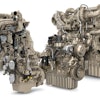
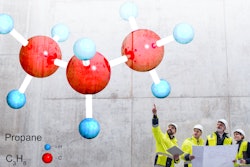
![Propane Autogas 4 C Hr R[2][1]](https://img.forconstructionpros.com/files/base/acbm/fcp/image/2019/03/PropaneAutogas_4C_hr_R_2__1_.5c87d4a4bb06c.png?auto=format%2Ccompress&fit=crop&h=167&q=70&w=250)
